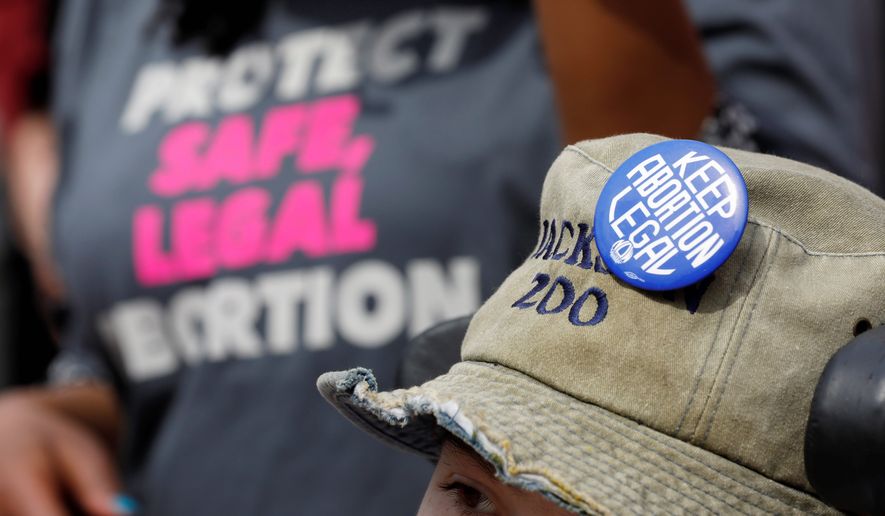Pro-choice advocates thought the law was settled and states were limited in how much they could regulate abortion clinics.
But they found themselves Wednesday back at the Supreme Court, asking the justices to strike down a Louisiana law mandating that clinics have admitting privileges to a local hospital should any complications arise during an abortion.
The high court had ruled against a similar law in Texas in 2016, and in a 5-4 ruling earlier this year, the justices put a hold on Louisiana’s version to allow time for the Center for Reproductive Rights to appeal.
Louisiana’s law is the latest piece of evidence that the legal consensus on abortion that has prevailed over the last quarter century — that it is legal, states can impose some minor restrictions particularly late in a pregnancy and federal taxpayers won’t be asked to fund it — is under assault.
“The stakes in this case are high for the rule of law,” said Nancy Northup, president of the Center for Reproductive Rights, which petitioned the high court to permanently block the Louisiana law.
Democratic state politicians have garnered much attention by expanding abortion rights — and in some cases suggesting a baby delivered after a botched procedure can be left to expire.
But Republican-led states are also active, seeking to expand bans against late-term abortions and to include restrictions much earlier in pregnancy.
“State legislatures in conservative states have been emboldened,” said Lois Shepherd, a bioethics professor at the University of Virginia. “My prediction is the Supreme Court is going to be cautious.”
Abortion law has been chaotic since the Supreme Court established a right to abortion until fetal viability in the 1973 Roe v. Wade decision, then reaffirmed that ruling — though allowing some restrictions — in 1992’s Planned Parenthood v. Casey.
State laws requiring pregnant people to wait one or two days and undergo counseling between seeking and obtaining an abortion generally have been upheld. But a Louisiana law requiring a 72-hour wait was deemed out of bounds.
Laws requiring notification or consent of a parent before a minor can obtain an abortion also have been upheld, so long as there is an option for a court to approve the abortion in cases where a juvenile can’t or doesn’t want to obtain a parent’s permission.
Courts have taken a dim view, though, of laws approved in recent years in GOP states outlawing abortion after the point when a fetal heartbeat can be detected, usually around the sixth week of pregnancy. Three such state laws have been blocked.
“A lot of women don’t even know they are pregnant then,” Ms. Shepherd said. “It’s clearly unconstitutional.”
But Denise Burke, senior counsel at Alliance Defending Freedom, a conservative Christian advocacy group, said several states have enacted “heartbeat” laws.
Pro-life advocates hope to win federal court approval for one of them in order to create the kind of judicial conflict that entices the Supreme Court to weigh in.
Lucinda Finley, a professor at the University at Buffalo School of Law, said that would be a major break.
“It’s a strategy to try to pass a bill that would get up to the Supreme Court, and there is no way the Supreme Court could uphold the bill without overruling Roe v. Wade,” she said.
In November, Louisiana’s ban on abortions after 15 weeks was blocked by a federal judge’s ruling on Mississippi’s 15-week ban. Mississippi currently outlaws abortion after 20 weeks, but a judge last month ruled North Carolina’s 20-week ban unconstitutional.
According to the reproductive health research group Guttmacher Institute, 17 states have 22-week abortion bans. Viability — the point at which a fetus could survive outside the womb — is estimated to occur between 24 and 28 weeks.
“The way current constitutional law is, states cannot ban abortion before viability,” Ms. Shepherd said. “Those should be unconstitutional, but we don’t know, of course, whether there may be a shift now that there is a clear conservative majority on the court.”
Kentucky’s law requiring those who are seeking an abortion to undergo counseling on an ultrasound of their pregnancy has survived judicial scrutiny at the U.S. Court of Appeals for the 6th Circuit.
Other states have weighed banning abortions because of a child’s sex, or predicted disability or genetic profile, such as Down syndrome.
And a federal ban on “partial-birth abortion” has survived judicial scrutiny, effectively outlawing the dilation-and-extraction procedure.
However, no lawsuit has yet been filed challenging a new law in New York that permits abortion up until the moment of birth.
Ms. Finley said Democrat-led states are reacting to the changing climate and landscape of abortion laws.
“It is the counter move to the larger number of states that are reacting to the current climate by passing increasingly restrictive bans on abortion in the hopes that they will lead to overruling Roe v. Wade,” she said.
• Alex Swoyer can be reached at aswoyer@washingtontimes.com.




Please read our comment policy before commenting.